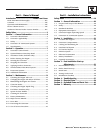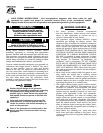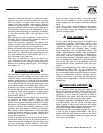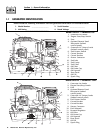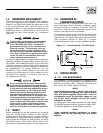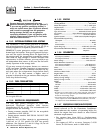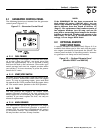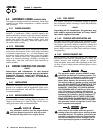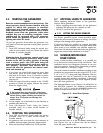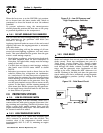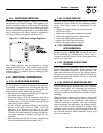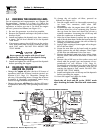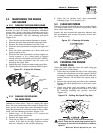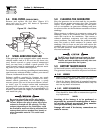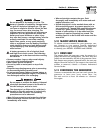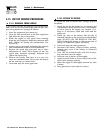
Generac
®
Power Systems, Inc. 9
Section 2 – Operation
PRIMEPACT 50 Recreational Vehicle Generator
2.5 STARTING THE GENERATOR
NOTE:
Read the vehicle manufacturer’s instructions. The
owner/operator should become familiar with the
vehicle in which this generator is installed.
Differences exist between vehicles. For example,
some vehicles may use a transfer switch to isolate
dockside power from the generator, while other
vehicles may use an isolating receptacle. Some
vehicles may be equipped with a DC converter,
which allows the generator to power certain DC
lighting and other DC loads.
To start the generator from either the generator con-
trol panel or from the optional remote panel, proceed
as follows:
1. Turn OFF electrical loads using the means pro-
vided in your vehicle (such as a main line circuit
breaker or transfer switch).
NOTE:
If starting from the generator control panel, turn
OFF loads by setting the generator’s main circuit
breaker to the OFF (or open) position. If starting
from a remote panel, turn OFF loads using the
means provided in the vehicle (such as a main cir-
cuit breaker). Electrical load circuits will be
turned ON after the generator has started, stabi-
lized and warmed up.
2. If you have not started the engine in more than
two weeks, press the Fuel Pump Primer switch
and hold it for about 10 to 15 seconds to prime
the fuel system. However, if the engine is warm,
skip Step 2.
3. Hold the engine Start/Stop switch in the START
position to crank the engine. Release the switch
when the engine starts.
If the engine does not start after it has been
cranking for 15 seconds, release the Start/Stop
switch and try again. Holding the switch for
longer than 15 seconds can damage the
starter motor.
4. Let the engine run at no-load for a few minutes to
stabilize and warm up.
5. Turn ON electrical loads using the means
provided (such as a main circuit breaker or
transfer switch).
2.6 STOPPING THE GENERATOR
1. Turn OFF all electrical loads using the means
provided (such as a main circuit breaker or
transfer switch).
2. Let generator run at no-load for a few minutes, to
stabilize internal engine generator temperatures.
3. Place the Start/Stop switch in its STOP position.
2.7 APPLYING LOADS TO GENERATOR
When applying electrical loads to the generator,
observe these guidelines:
• Before applying electrical loads, let the generator
stabilize and warm up for a minute or two.
• DO NOT overload the generator.
2.7.1 LETTING THE ENGINE STABILIZE
The generator supplies correct rated voltage only at
the proper governed speed. Some electrical appli-
ances may be extremely sensitive to voltage. Incorrect
voltages can damage such appliances.
If electrical loads are applied at reduced operating
speeds, such loads imposed on the engine when suffi-
cient power is not available may shorten engine life.
Never turn ON electrical loads until after the generator
engine has started and stabilized at no-load.
2.8 SUMMER/WINTER HEAT
RISER SYSTEM
Under certain weather conditions, it is possible for
ice to form in the venturi area of the carburetor. This
condition can be very dangerous because it can pre-
vent the governor system from functioning properly,
which results in a “runaway” engine.
The most common weather conditions leading to this
problem are temperatures in the range of 25° F to 35°
F (-4° C to 1.7° C), along with high humidity. This ice
formation also can be attributed to the load being
applied during these weather conditions. Generators
running with no-load or light loads applied usually
have the most problems.
The Summer/Winter Lever (Figure 2.3) should be in
the WINTER position for ambient temperatures
below 40° F (4.4° C) and in the SUMMER position for
ambient temperatures above 40° F (4.4° C).
Figure 2.3 – Heat Riser System
When the heat riser is in the SUMMER (down) posi-
tion (Figure 2.2), air is drawn into the air cleaner
from the upper intake tube.
◆
!



